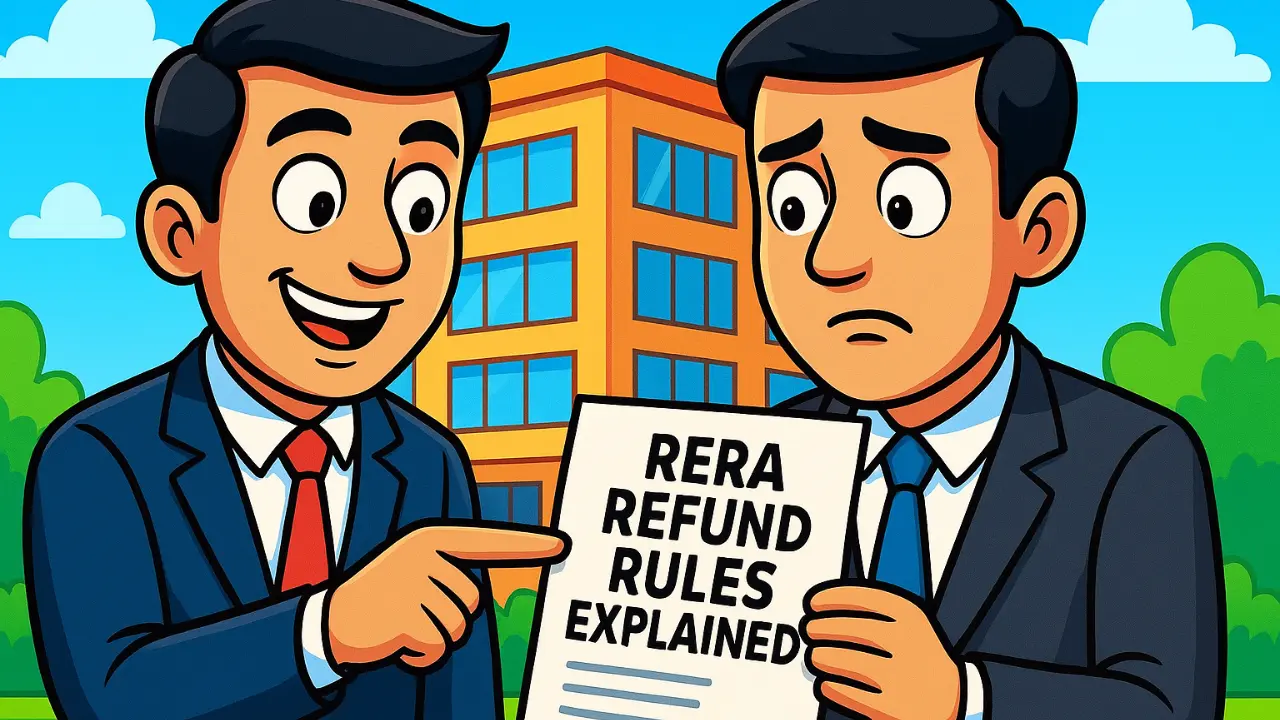RERA Refund Rules Explained: What Happens When No Agreement Is Signed

The Real Estate (Regulation and Development) Act, 2016 (RERA) is central to safeguarding homebuyers in India. Among its many protections, RERA aims to ensure that buyers can claim refunds when promoters fail to meet their contractual or statutory obligations. Yet complications arise when no formal agreement for sale has been executed between the promoter and the allottee.
In such cases, applying RERA refund rules becomes legally intricate. Although courts and authorities often agree that buyers deserve their deposits back, the basis for refund decisions varies. This article illuminates those divergences, focusing especially on interpreting RERA refund rules when there is no signed agreement. By analyzing key legal precedents and statutory provisions, the article argues for a more coherent approach to protect buyer interests.
Understanding the Legal Framework: RERA Refund Rules at a Glance
Section 13 & the 10% Cap
RERA’s Section 13(1) prohibits promoters from accepting more than 10% of the property cost as an advance unless a properly executed sale agreement is in place. This safeguard is a foundational part of RERA refund rules: if violated, the promoter may lose the right to retain any portion of the payment.
Section 18: Exit and Refund Option
One of the most critical refund provisions, Section 18, gives homebuyers a statutory option to exit the project and demand a refund (with interest) if the promoter fails to complete or deliver the property in accordance with the terms. The section also allows for compensation if buyers choose to continue with the project.
When no agreement is executed, the question is whether Section 18 is still available as a basis for refund claims. Some tribunals and courts say yes; others are more restrictive.
Other Provisions: Section 37, Section 61 & Section 19(4)
- Section 37 empowers adjudicating authorities to issue binding orders in case of breaches (including refund directives).
- Section 61 penalizes promoters for violations of RERA, sometimes used in conjunction with refund orders.
- Section 19(4) allows purchasers to withdraw from registration if the project registration is revoked or suspended — triggering refund rights under certain conditions.
Thus, adjudicators sometimes weave together sections 13, 18, 37, 61 and 19 to apply RERA refund rules even when the direct path (via agreement) is missing.
Also Read
Diverging Judicial Approaches: Four Illustrative Cases
Below are four cases that show how RERA refund rules have been interpreted differently when no formal agreement exists.
1. Bhavani Velivala v. Pagadala Constructions (TG RERA)
Facts: The promoter accepted more than 10% of the flat cost without executing a sale agreement, violating Section 13.
Ruling: TG RERA ordered a full refund of ₹12.1 lakh plus a penalty of ₹2.69 lakh.
Reasoning: The Authority treated violation of Section 13 alone as enough ground for refund, bypassing the need for Section 18 analysis. It emphasized protecting homebuyers from unfair forfeiture even in absence of formal agreement.
2. Sachin Tomar & Shivaji Tomar v. Ensaara Metropark (MahaREAT)
Facts: Buyers alleged delayed possession and lack of agreement despite payments made.
Ruling: MahaREAT declined to order refund. Instead, it directed the promoter to execute the agreement for sale and pay compensation for delay.
Reasoning: While acknowledging promoter default, the Tribunal preferred enforcing contractual obligations rather than cancellation. Though Section 18 was invoked, refund was withheld.
3. Kakad Housing Corporation v. Rajkumari Singh (MahaREAT)
Facts: Promoter collected more than permissible advance without signing agreement and failed to timely deliver possession.
Ruling: MahaREAT allowed refund with interest under Section 18, despite absence of formal agreement.
Reasoning: The Tribunal held that non-execution of agreement cannot be exploited to avoid liability under RERA refund rules. It refused to allow forfeiture or retention by the promoter in such cases.
4. Tejas Shoor v. Godrej Vestamark LLP (District Court, Saket)
Facts: Buyer canceled allotment and sought refund, though no agreement existed.
Ruling: The court held that Section 79 (bar on civil court jurisdiction) does not apply when no sale agreement is in place. Thus, civil courts may hear the case and RERA Authority is not empowered to direct refund in buyer-initiated cancellations.
Reasoning: The court differentiated between promoter default and buyer’s voluntary cancellation. It held that RERA refund rules do not clearly provide for refunds in voluntary cancellations without agreement, making civil courts the proper forum.
Key Insights from Judicial Trends
From these cases, several patterns (and inconsistencies) emerge:
- Violation of Section 13 is frequently treated as a trigger for refund entitlement — even when an agreement is missing.
- Tribunals differ on whether to rely purely on Section 18 or whether to craft alternative legal routes.
- Jurisdictional challenges arise where civil courts claim authority if no agreement exists or buyer cancels of his own accord.
- Use of inherent/ancillary powers is sometimes invoked to supplement RERA refund rules, though not uniformly accepted.
These varying approaches under the banner of RERA refund rules leave homebuyers uncertain about which path will apply in their own case.
Role of the Supreme Court and Recent Precedents
In Greater Mohali Area Development Authority v. Anupam Garg, the Supreme Court affirmed that homebuyers have a right to refund when promoters default — even without a registered agreement — by relying on alternative documents like letters of intent and payment records. However, the judgment stopped short of addressing buyer-initiated cancellations or cases of complete absence of any contract.
While this sets a favorable tone for refund claims, it does not fully resolve the interpretative gaps in RERA refund rules when no formal agreement exists and the buyer cancels.
Also Read
Proposed Uniform Approach to RERA Refund Rules
To reduce ambiguity and ensure fair outcomes, a consistent framework is needed:
- Treat Section 13 violation as ground zero. If a promoter accepts more than 10% without agreement, that breach alone should give the buyer refund rights — in line with RERA’s protective purpose.
- Invoke Section 18 as the primary remedy. Even if the formal agreement is missing, the buyer should lawfully be allowed to invoke Section 18 to exit and claim refund with interest.
- Use Section 37 / ancillary powers only as support. Rather than competing, these should reinforce the refund order, not replace it.
- Limit the role of civil courts. Unless clearly excluded by RERA or rules, civil courts may have residual jurisdiction only in exceptional cases — the RERA tribunal should remain the primary forum for refund disputes.
- Clarify buyer-initiated cancellation rights. RERA rules or appellate precedent should explicitly state whether voluntary cancellation entitles refund, and if so, under what deductibles (if any).
With a uniform interpretative policy of RERA refund rules, both buyers and developers can have greater certainty and avoid protracted legal battles.
Conclusion
Interpreting RERA refund rules in cases where no agreement exists poses one of the more complex challenges in real estate law today. While courts and tribunals often agree that deposit refund is due, the legal path taken differs — from pure Section 13 violations, to invoking Section 18, to using ancillary powers, or even shifting to civil jurisdiction.
A clearer, buyer-friendly standard — anchored in Section 13 breach triggering Section 18 rights — would reduce conflict, increase predictability, and better fulfill RERA’s consumer protection mandate. For now, homebuyers should document every payment, retain allotment letters and receipts, and seek legal recourse without delay when facing refund issues under RERA.





